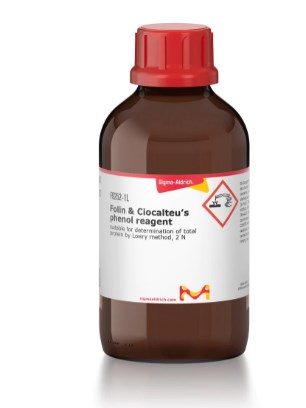Description
General description
Folin & Ciocalteu′s phenol reagent is most commonly used in the Lowry method for determining protein concentration.It has also been used for the quantification of total phenolics.
In this method, protein is pretreated with copper(II) in a modified biuret reagent (alkaline copper solution
stabilized with sodium potassium tartrate). Addition of the phenol reagent generates chromogens that give increasing absorbance between 550-750nm. Normally, absorbance at the peak (750nm) or shoulder (660nm) are used to quantitate protein concentrations between 1-100 mg/ml while absorbance at 550nm is used to quantitate higher protein concentrations.
In the absence of copper, color intensity is determined primarily by the tyrosine and tryptophan content of the protein, and to a lesser extent by cysteine and histidine. Copper(II) has no effect on color formation by tyrosine, tryptophan, or histidine, but reduces color formation due to cysteine..
Many modifications of the original assay procedure have been published, including methods for enhancing the color development, for determining the content of insoluble proteins, and for automating the procedure. Compounds including many buffers, chelating agents, detergents, and cyclic organic compounds can interfere with the Lowry protein assay.
Folin & Ciocalteu′s phenol reagent can also be used as a spray reagent in chromatographic procedures.
stabilized with sodium potassium tartrate). Addition of the phenol reagent generates chromogens that give increasing absorbance between 550-750nm. Normally, absorbance at the peak (750nm) or shoulder (660nm) are used to quantitate protein concentrations between 1-100 mg/ml while absorbance at 550nm is used to quantitate higher protein concentrations.
In the absence of copper, color intensity is determined primarily by the tyrosine and tryptophan content of the protein, and to a lesser extent by cysteine and histidine. Copper(II) has no effect on color formation by tyrosine, tryptophan, or histidine, but reduces color formation due to cysteine..
Many modifications of the original assay procedure have been published, including methods for enhancing the color development, for determining the content of insoluble proteins, and for automating the procedure. Compounds including many buffers, chelating agents, detergents, and cyclic organic compounds can interfere with the Lowry protein assay.
Folin & Ciocalteu′s phenol reagent can also be used as a spray reagent in chromatographic procedures.
Application
Folin & Ciocalteu′s phenol reagent is used for the estimation of total phenolic content in samples.
Packaging
100, 500 mL in glass bottle
PROPERTIES
form
liquid
concentration
2 N
color
clear yellow
pH
<0.5 (20 °C)
density
1.240 g/cm3 at 20 °C
suitability
suitable for determination of total protein by Lowry method
application(s)
diagnostic assay manufacturing
hematology
histology
storage temp.
room temp

![Hydrochloric acid 2 mol/l (2 N) Titripur® [1 Litre]](https://idealmedical.co.za/wp/wp-content/uploads/2020/07/256-Hydrochloric-acid-200x200.jpg)



Reviews
There are no reviews yet.